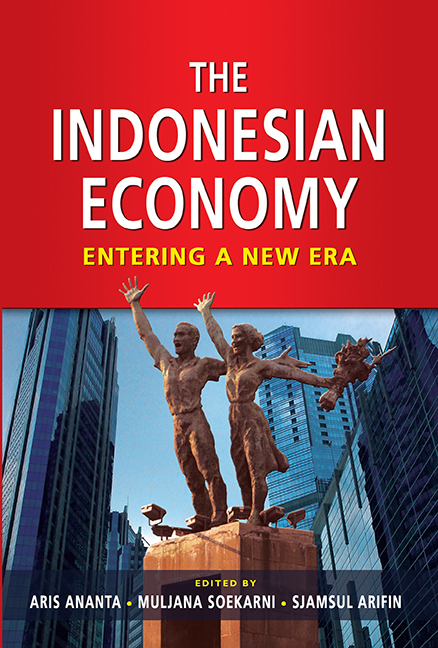Book contents
- Frontmatter
- Contents
- List of Tables
- List of Figures
- Message from the Deputy Governor of Bank Indonesia
- Message from the Director of the Institute of Southeast Asian Studies
- Foreword
- Preface
- Contributors
- PART I INTRODUCTION
- PART II MONETARY AND FISCAL POLICIES
- PART III DOMESTIC ECONOMY
- PART IV SEARCH FOR NEW PARADIGMS
- 10 Embracing ASEAN Economic Integration 2015: A Quest for an ASEAN Business Cycle from Indonesia's Point of View
- 11 Governance and Economic Performance
- 12 A Search for a World Development Paradigm: With Specific Recommendations for Indonesia
- Index
10 - Embracing ASEAN Economic Integration 2015: A Quest for an ASEAN Business Cycle from Indonesia's Point of View
from PART IV - SEARCH FOR NEW PARADIGMS
Published online by Cambridge University Press: 21 October 2015
- Frontmatter
- Contents
- List of Tables
- List of Figures
- Message from the Deputy Governor of Bank Indonesia
- Message from the Director of the Institute of Southeast Asian Studies
- Foreword
- Preface
- Contributors
- PART I INTRODUCTION
- PART II MONETARY AND FISCAL POLICIES
- PART III DOMESTIC ECONOMY
- PART IV SEARCH FOR NEW PARADIGMS
- 10 Embracing ASEAN Economic Integration 2015: A Quest for an ASEAN Business Cycle from Indonesia's Point of View
- 11 Governance and Economic Performance
- 12 A Search for a World Development Paradigm: With Specific Recommendations for Indonesia
- Index
Summary
INTRODUCTION
Indonesia, as part of ASEAN, having proclaimed its end goal of regional cooperation to achieving regional economic integration (ASEAN Economic Community or AEC) in 2015, has inevitably embrace this commitment through the fullest preparation in its domestic economy. However, while the commitment brings benefits and the opportunity for it to compete in globalized markets, it also exposes Indonesia's economy to external shocks.
As the biggest economy in ASEAN, Indonesia needs to equip its domestic players fully with sufficient knowledge on the targets, benefits, and opportunities, as well as the challenges of the regional economic integration. Therefore, it is important to understand the potential benefits to be gained and the challenges to face from AEC 2015. Currently, the trade volume and financial linkages of the ASEAN region have increased rapidly, both intraregionally and with the rest of the world. However, one main challenge for the economies in the region, including Indonesia, is to reap the benefits from the deepening economic and financial integration, while minimizing the possible costs from such an integration. This condition inevitably means embarking on a new paradigm to manage the economy amid the regional integration process.
The path to regional economic integration is pursued through the liberalization of goods and services, investment, skilled labour, and freer capital flows, following the ASEAN blueprint for national preparedness. A reporting and monitoring system has also been developed to ensure implementation while allowing assessment on a better way to achieve economic integration. Regionally, the monitoring system is established at various levels and by related agencies, coordinated at the ASEAN Leaders’ Summit — the summit attended by leaders of ASEAN. At the national level, each country works on its agenda through working committees which address subsequent issues and follow liberalization schedules. In Indonesia, all the work (economic and financial areas) at the national level is coordinated by the coordinating Ministry of Economy, while the economic area is particularly monitored by the Ministry of Trade.
At the macro level, the process of dynamic transformation to accelerate economic and financial integration into the global market has raised an important question on the characteristics of Indonesian business cycle. A higher degree of integration in trade and the financial sector is expected to support the synchronization of business cycles, which would greatly influence policy coordination and possibly lead to monetary union.
- Type
- Chapter
- Information
- The Indonesian EconomyEntering a New Era, pp. 313 - 344Publisher: ISEAS–Yusof Ishak InstitutePrint publication year: 2011



